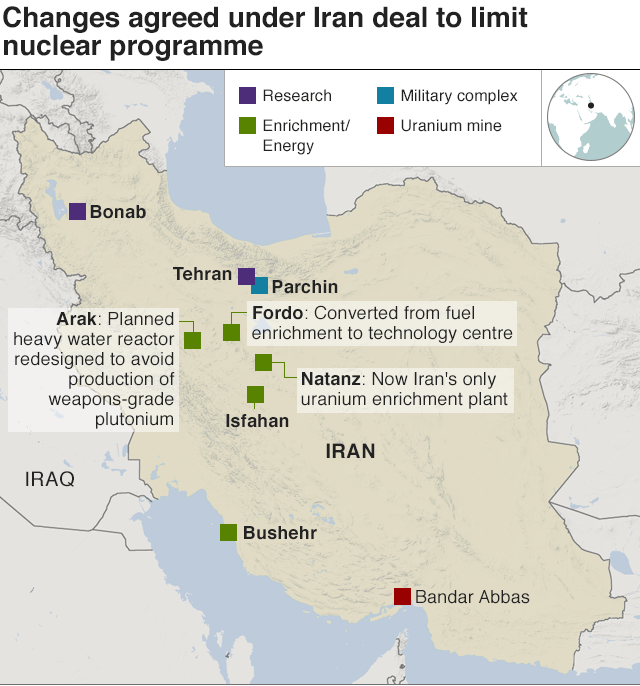International Relations
Iran Nuclear Deal Talks
- 08 Aug 2022
- 5 min read
For Prelims: Joint Comprehensive Plan of Action, Countering America's Adversaries Through Sanctions Act (CAATSA), International Atomic Energy Agency (IAEA)
For Mains: Joint Comprehensive Plan of Action and its significance for reviving India’s relation with Iran
Why in News?
Recently, there has been a fresh round of talks over Iran's nuclear programme in Vienna to revive the 2015 nuclear deal which is also known as the Joint Comprehensive Plan of Action (JCPOA).
- Officials from various countries including Iran were meeting for the first time since March 2022.
What is the Iran Nuclear Deal?
- About:
- The Joint Comprehensive Plan of Action aims to guarantee the civilian nature of Iran's nuclear programme in exchange for a gradual lifting of sanctions.
- Iran signed the agreement with the five permanent members of the U.N. Security Council — the U.S., Russia, France, China, and the United Kingdom — as well as Germany and the European Union.
- Under the deal, Iran agreed to significantly cut its stores of centrifuges, enriched uranium and heavy-water, all key components for nuclear weapons.
- Iran also agreed to implement a protocol that it would allow inspectors from the International Atomic Energy Agency (IAEA) to access its nuclear sites to ensure Iran would not be able to develop nuclear weapons in secret.
- Issues:
- Due to the unilateral withdrawal of the United States in 2018 under former president Donald Trump and the re-imposition of U.S. sanctions, Iran has backtracked on its obligations.
- Iran subsequently exceeded the JCPOA's uranium enrichment rate of 3.67%, rising to 20% in early 2021.
- It then crossed an unprecedented 60% threshold, getting closer to the 90 percent needed to make a bomb.
- Opposing countries:
- Israel, America’s closest ally in the Middle East, strongly rejected the deal, and other countries like Iran’s great regional rival Saudi Arabia, complained that they were not involved in the negotiations even though Iran’s nuclear programme posed security risks for every country in the region.
What is the significance of JCPOA for India?
- Enhance regional connectivity:
- Removing sanctions may revive India’s interest in the Chabahar port, Bandar Abbas port, and other plans for regional connectivity.
- This would further help India to neutralize the Chinese presence in Gwadar port, Pakistan.
- Apart from Chabahar, India’s interest in the International North-South Transit Corridor (INSTC), which runs through Iran, and will improve connectivity with five Central Asian republics, may also get a boost.
- Energy Security:
- Due to the pressure linked to the US Countering America’s Adversaries Through Sanctions Act (CAATSA), India has to bring down oil imports to zero.
- Restoration of ties between the US and Iran will help India to procure cheap Iranian oil and aid in energy security.
Way Forward
- The US would have to factor in not only Iran’s nuclear programme but also its increasingly hostile behavior in the region. It would also have to take into consideration the reality of the new multipolar world, in which its unilateral leadership is no longer guaranteed.
- Iran would have to consider the rapidly changing dynamics in the Middle East, given that Israel has recalibrated its relations with several Middle Eastern Arab countries in recent years.
UPSC Civil Services Examination Previous Year Question (PYQ)
Q. Which of the following is not a member of ‘Gulf Cooperation Council’? (2016)
(a) Iran
(b) Saudi Arabia
(c) Oman
(d) Kuwait
Ans: (a)
Exp:
- The Gulf Cooperation Council (GCC) is an alliance of 6 countries in the Arabian Peninsula – Bahrain, Kuwait, Oman, Qatar, Saudi Arabia and the United Arab Emirates. Iran is not a member of the GCC.
- It was established in 1981 to promote economic, security, cultural and social cooperation between the members and holds a summit every year to discuss cooperation and regional affairs. Therefore, option (a) is the correct answer.







